DETAILED YORUBA TRADITIONAL WEDDING
The Yoruba traditional marriage ceremony even though a serious affair, is full of playful banter, rich contemporary Nigerian music, graceful colours and sumptuous meals. Weddings in Yoruba land is an occasion to show your best outfits, handbags, jewelry and even dancing styles.It is carried out in different stages which will be discussed exclusively in this article.
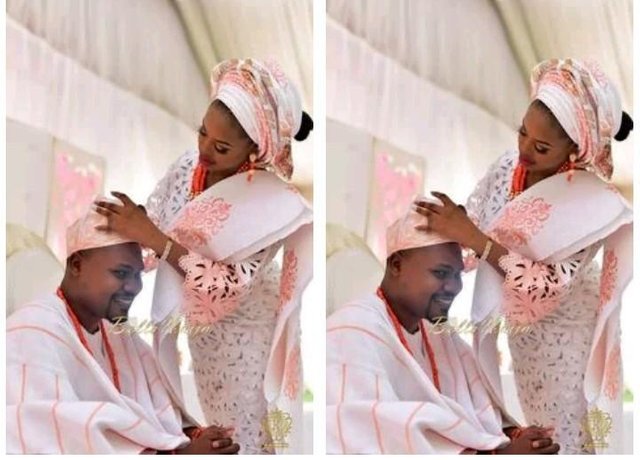
**THE INTRODUCTION ** The families of the bride and groom meet long before any engagement ceremony takes place. The groom visits the family of the bride in company of his father and some family members. The occasion is an informal introduction without fanfare but a cordial atmosphere to know each other. The informal introduction does not require much except some tubers of yam and a few bottles of wine; the family of the bride hosts the visitors with a simple meal of their coice. Apart from all round introductions, they might discuss when the event would take Place.
BRIDE'S OUTFIT The bride's outfit is a reflection of what the female guests will wear, she might choose, damask, lace, Nigerian wax fabric or any fabric that appeals to her. The outfit consists of gele which is the head tie, the buba (the blouse) and an iro which is a large material tied round her waist and is usually ankle length. The colours she chooses reflects the colour theme her family has chosen but should also complement the groom's outfit and look identical. She can wear accessories like gold necklace, beads, bangles, gold earrings and shoes to match.
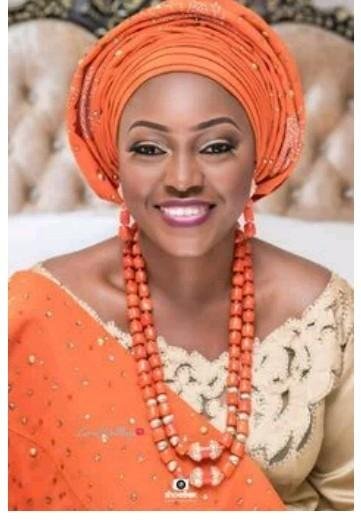
GROOM'S OUTFIT: The groom could decide to wear an Agbada which is a two layered material of heavy dimensions like the Aso-Oke (traditional hand-woven material) , it might be cotton, and damask or he might wear lace or even wax fabric (Ankara). His colour combination should complement the bride's and reflect the colour his family has chosen.
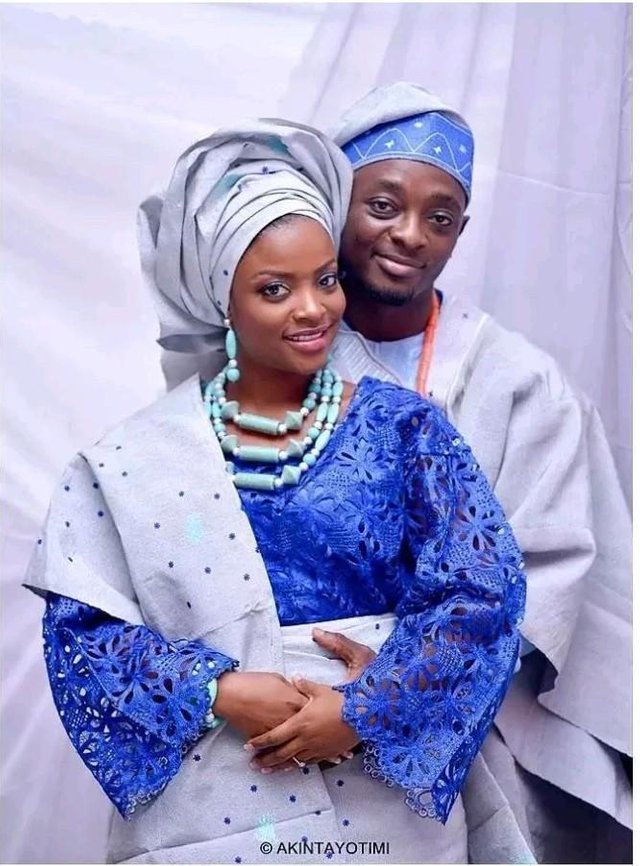
THE TRADITIONAL ENGAGEMENT The traditional engagement is carried out by a contracted professional called the Alaga ijoko which translated, means the traditional master of ceremony. The professional could be a member of the bride's family or a complete stranger. The Alaga Ijoko is usually a woman and her duty is to properly officiate and coordinate the proceeding so each provision of tradition is strictly adhered too. There are different stages she coordinates and each stage might elicit a collection of cash which the Alaga keeps, various fines are paid and formal introduction of the groom accompanied by his age mates and friends which also involves prostrating to the family of the bride to formally request their daughter's hand in marriage. The groom's family also hire a professional called the Alaga iduro which means the standing master of ceremony, who follows the groom and family to ask for the hand of their daughter. The Alaga iduro is also a professional custodian of Yoruba wedding tradition. She could be a family member or hired for the occasion.
STEPS TO FOLLOW DURING YORUBA TRADITIONAL WEDDING
WELCOME
The arrival of the grooms family signals the start of the ceremony, they are required to be on time (no 'african' time here) and can be sent back or fined for being late. Once inside, they are introduced by their Alaga(master of ceremony) and proceed to kneel and greet the brides family.
THE PROPOSAL AND ACCEPTANCE
This elaborate proposal 'letter' is presented by the grooms family and read out loud by the youngest member of the brides family. After which an acceptance letter is given by the brides Family. The letter reading which is read by a young lady from the groom's family also asking for the hand of the bride in marriage. The bride's family also responds with a letter of their own.
MEET THE GROOM
The groom typically makes his appearance by dancing in with his friends then proceeds to prostrate two times with his friends and once alone to his new in-laws. During the third prostration, both families stretch out their arms and pray for the groom. He then prostrates once with his friends for his family before proceeding to his seat. Some of the engagement protocols officiated by the Alaga ijoko is carried out in the absence of the groom, the professionals go through a question and answer format were the bride's moderator puts the representatives of the groom through some hoops. At one point the groom's presence is needed and he comes forward and goes through the introduction process to the bride's family and parents. When all requirements are met the groom is led and allowed to seat on one of the two large chairs conspicuously placed in from of the guests. The chairs are artfully decorated in the chosen ceremonial colours by the wedding planner.
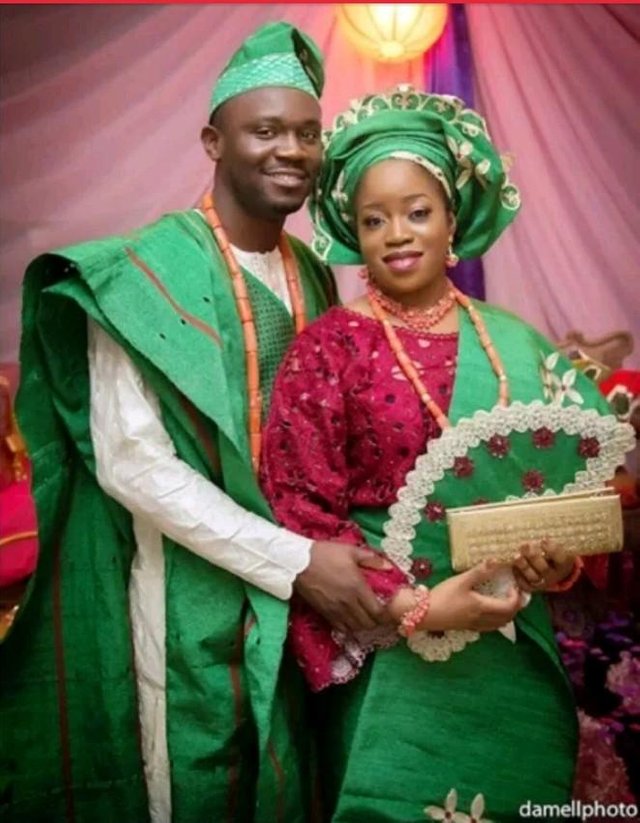
MEET THE BRIDE
The veiled bride makes her appearance escorted by her friends who dance her in. She kneels in front of her parents for their prayers and blessings, then does the same with her future husbands parents after which she is unveiled and joins her future husband. Though not compulsory, some brides put the grooms cap on his head, this demonstrates her acceptance of the proposal.The bride is heralded into the venue of the ceremony followed by her friends, all dressed in traditional attires like buba and iro, as they join her in boisterous dance down the hall. The bride also goes through a few protocols but money is only given to her and not taken from her as in the case of the groom. She is introduced to the groom's family before she takes her place beside the groom. At this stage, they may consider themselves married. The wife displays some wifely traits by feeding the groom some cake and wine, even a kiss to the amusement of the guests
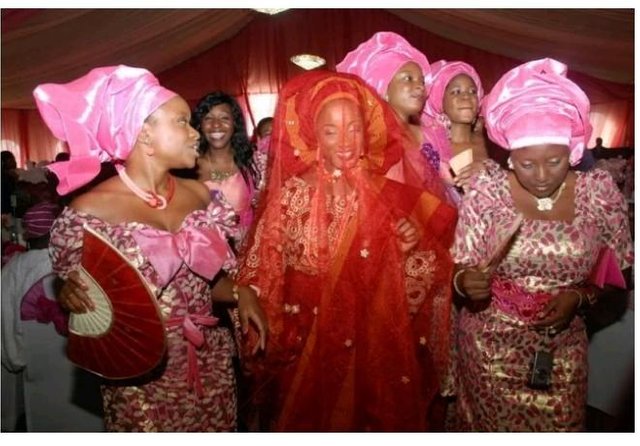
**SELECTION OF GIFTS **
On instruction from the Alaga Ijoko she picks the gift she wants from the usually dazzling selection brought by her in-laws (a list with the required items would have been given prior to the engagement). She is expected to pick the Bible or Qu'ran to which her engagement ring is attached. She gives her selection to her husband who puts the ring on her finger and watches happily as she shows off her ring to the world.
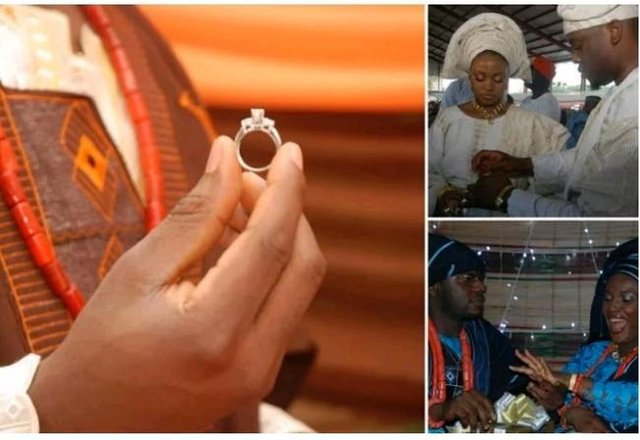
BRIDE PRICE
Various envelopes containing everything from the bride price to money for the wives, children and elders in the her family are handed over to the brides family. It is very common practice for them to the envelope containing the bride price, the belief is that both families have become one and are giving their daughter away versus 'selling' her.
** CUT THE CAKE**
The engagement cake also known as 'Akara Oyinbo' is a symbol of happiness due to its rich and sweet ingredients. The more recently introduced cake cutting ceremony is usually for photo opportunities.
PARTY PARTY PARTY
Final prayers are said and the occasion is ended with lots of love, eating, music and dancing!
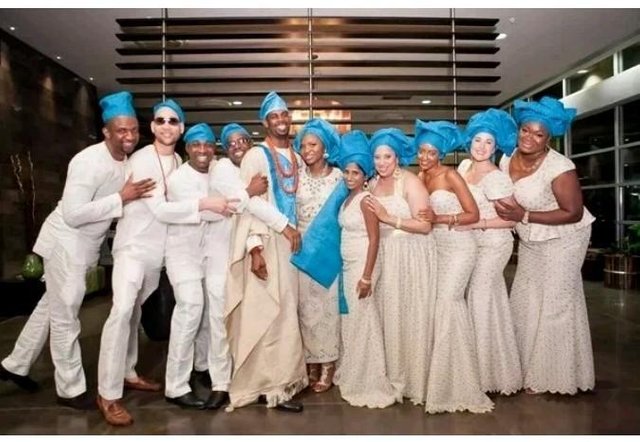
The engagement is an integral part of the traditional marriage and as the ceremony proceeds, items listed for the engagement that was given to the groom's family is presented. The items vary slightly in each Yoruba traditional wedding but the general articles are the same.
ITEMS REQUESTED BY THE BRIDE'S FAMILY
Yoruba Engagement List (varies slightly from family to family and Yoruba state to state)
42 Big Tubers of Yam
42 Big Cola Nuts
42 Big Bitter Cola (Orogbo)
42 Pieces of Dry Fish
42 Pieces of Alligator Pepper (Ata're)
2 Bottles of Honey
2 Pairs of Shoes and Bags
2 Scarves
1 Wrist Watch
1 Bible or Qu'ran
1 Engagement Ring
1 Big Suitcase
1 Traditional Aso-Oke
1 Big Dish of 'Aadun'
1 Bag of salt
1 Bag of Sugar
1 Umbrella
Bride Price: There is no fixed amount of money for the bride price, as it is usually dictated by the bride's family and is subject to negotiation. However, there are other fees to be paid by the groom/his family (which are also negotiable);
Owo Isigba - N500. This is used to open the packaged gift items brought by the bridegroom.
Owo Ikanlekun (entrance fee) - N500.
Owo Ijoko Iyawo - N1,000. This is the money given to elders in the groom's family.
Owo Isiju Iyawo(fees paid to unveil the bride) - N500.
Owo Baba Gbo- N500. This amount is paid to ask for the bride's father Consent.
Owo Iya Gbo- N1,000. This is the amount of money paid to ask for the bride's mother consent.
Owo Omo Ile Okunrin - N500. This is the money given to all male children in the bride's family.
Owo Omo Ile Obinrin- N500. This is the money given to all female children in the bride's family.
Owo Iyawo Ile- N500. this is the money given to all wives in the bride's family.
Owo Ijoko Agba- N1,000. This is the amount of money reserved for elders of the bride's family.
Owo Alaga Ijoko(amount of money reserved for the MC) - N500.
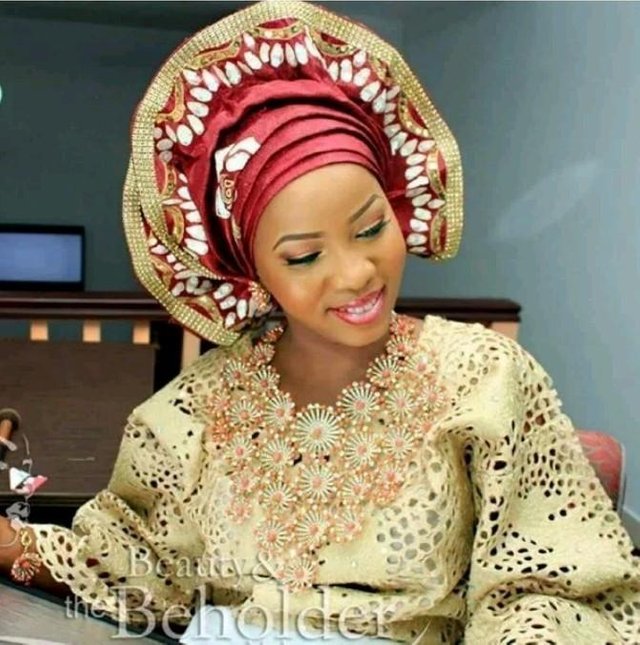
**CONCLUSION **
Yoruba traditional marriage is seen as an occasion for family members to reunite and catch-up on current happenings. They also see find old friends and acquaintances. It is a fun filled and meticulously planned period that announces to the world the union of their loved ones. The couple can choose to include a civil union through a court wedding and also go through a church wedding and a separate wedding reception.